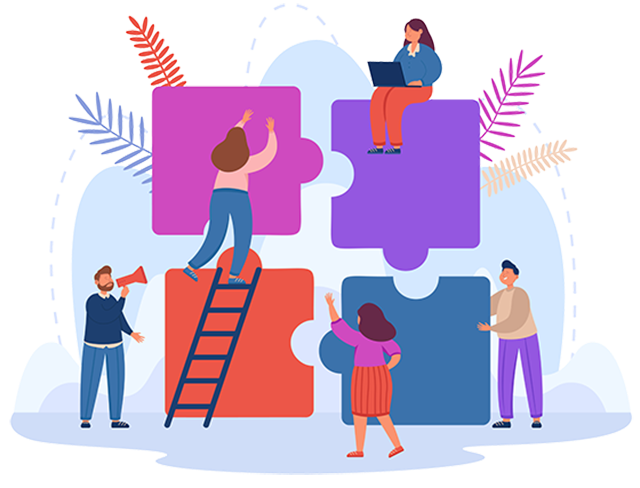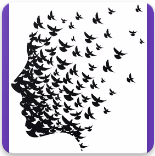F E A R S
Fear of conflict
Here you find background information, a fear test and an effective approach to treating the fear of conflict.

6 minutes reading time.
People who are afraid of conflict try to avoid arguments. As a conflict-averse person, a difference of opinion or addressing a disagreement scares them. They fear that it could lead to an argument that involves attacks and rejection and disrupts harmony.
If someone is afraid of conflict, they believe that expressing a contrary opinion or revealing their own dissatisfaction would automatically lead to a critical situation to which the other person would definitely react with dislike and incomprehension. The conflict-shy person assumes that clarifying discussions in which everyone argues their point of view would be more likely to cause an argument than lead to a solution. So the person concerned prefers to remain silent instead of addressing the problem. If the point of conflict is brought up by others, people who are afraid of conflict tend to give in and appease the other person. This is because their ultimate goal is to maintain harmony, as differences and discussions appear threatening to them.
You may also be familiar with the fact that you are sometimes afraid of stepping on someone else’s toes if you want to express criticism or your personal displeasure about something. If you are afraid of saying something that bothers you or has hurt you, in the general expectation of a negative confrontation, you will behave in a conflict-averse manner if you cannot approach the other person openly. However, so many little things can add up and ultimately lead to the person being upset. A calm conversation is no longer possible and a heated exchange of words may ensue, which no longer contains the necessary objectivity, but actually the feared hostility.
A fear of conflict and confrontation leads the person concerned to accept the current situation as it is. People who are conflict-averse prefer to adapt and swallow their resentment. They do not take their feelings seriously when they feel angry or offended about something and try to play down a problem situation to themselves and sometimes to others. By convincing themselves that it is not that bad, they avoid the need to address the issue and clarify the situation. They are afraid to take a stand because they fear that they will be met with fierce rejection – even if this is not to be expected from a sober point of view, for example because they are dealing with a friend.
Fear of conflict symptoms
Giving in to the fear of conflict has several consequences, which in principle have a more negative effect on the person concerned than dealing with the conflict itself would.
Have you ever put up with something and said nothing? People who are afraid of conflict are more likely to put up with injustice. They are afraid of provoking disputes and prefer not to speak up as a result. As a result, they are more likely to find themselves in situations in which they feel disadvantaged. This is because they tend to subordinate themselves and not draw attention to their concerns and needs. They are more likely to keep ideas and suggestions to themselves as soon as they might offend someone.
They always try to avoid a difference of opinion. Conflict-averse people try to appease themselves at all costs if they are dissatisfied with something. They wrestle with themselves in an inner dialog in order to influence their own perception in such a way that disclosing the conflict does not seem absolutely necessary. In reality, however, their own feelings are suppressed. The fear of conflict is then so great that those affected prefer to bend rather than have an open discussion.
Sometimes, however, the ideas of two people are so far apart that they cannot be ignored. If a conflict-averse person is confronted with a difference of opinion, they will usually behave in a way that minimizes friction. Affected people are inclined to give in quickly, make concessions and agree to compromises in favor of the other person. They do all this to avoid falling out of favor because they believe they would otherwise lose the other person’s approval. Unfortunately, he no longer sees that others would show him respect if he stood up for himself and courageously expressed his opinion – as long as he also took the other person’s opinion into account.
Conflicts are avoided for fear of rejection. But if you keep something bottled up for too long, you will become very unhappy. One’s own point of view can be neglected until the point where one little thing breaks the camel’s back. As already mentioned, constructive debate is then not possible. At the moment when all the emotional pressure from the accumulated baggage is released, emotions boil over, so that the conflict is typically accompanied by blame and generalized statements such as “you always do…”. The pent-up anger makes us want to deliberately hurt the other person. Offenses are then intended to make the other person feel this.
Fear of conflict causes
As conflicts ensure that we are confronted with criticism or new perspectives, they hold a certain potential for further development. By exchanging opinions, we gain new insights about ourselves and are sometimes made to see characteristics or behaviors in ourselves that we didn’t notice before. These may well be negative aspects of ourselves, otherwise they would not have led to conflict. So a mirror is held up to us, which can of course be unpleasant. And those who shy away from taking a closer look at themselves will also unconsciously avoid conflict.
The fear of conflict always includes the fear of rejection and loss of relationships. It is likely that children have already experienced unpleasant consequences such as being ignored if they start a discussion or talk back. Anyone who was unable to express their own wishes to their parents as a child without having to fear a dismissive reaction cannot build up healthy self-confidence. Even in adulthood, you will become dependent on the opinions of others and unconsciously measure your worth by whether you please others.
Fear of conflict therapy
But whatever fear you have inside you, you can resolve any fear. Even the fear of conflict. If you do this, not only will the fear be gone, but the blockages will also fall away.
Dissolve fear of conflict
So that you can be sure that you really do have a fear of conflict, we offer you a free fear of conflict test here. You can use it to check whether you really have the fear of conflict within you.
Fear of conflict test
You will find the fear test in the round, blue circle at the bottom right of the screen. If you click on it, it will open and you can start immediately. Free, without advertising and without registration!
You start by entering “fear of conflict” in the fear test. Once you have found what you are looking for, you can resolve your fear of conflict with our “Fear Therapy” app. The link can be found below the test. The app works without confrontation and without traveling into the past and is really simple. So you don’t need to be afraid of the treatment itself.
Once you have resolved the fear of conflict, use the test to check yourself for the following elements, as fears can usually arise in a complex. Once you have found one, resolve it with the “Fear Therapy” app. Incidentally, you can use this for the rest of your life and can also use it to work through any other issue in depth!
- The fear of confrontation
That’s it already. Start today, it’s easier than you think! And resolving fears always has a very liberating, calming and relaxing effect.
WHOEVER DOES NOT RESOLVE THE CAUSES IS ONLY WORKING ON SYMPTOMS!
“Thinking will not overcome fear, but acting will.”

Fear Therapy
Effective fear treatment in an app!
Effective content and techniques for treating fears/anxiety.
Thoroughly dissolve any fear, including the associated negative cognition/belief!
No direct confrontation (exposure) with the fear!
Also deals with individual cognitions and all other emotions such as shame, sadness, hate, anger, etc.
Buy the "Fear Therapy" app now for just 19.99 Euros!
Available in the Apple™ App Store or in the Google™ Playstore.


For all questions ...
... please do not hesitate to contact us. Whether it's a question of understanding, product details or questions about treatment.
We are happy to help!

“The highest happiness of man is liberation from fear.”
Walther Rathenau, (1867 - 1922), Politician, writer, industrialist 1922



